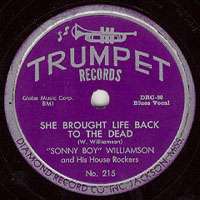Trumpet Records

Trumpet Records was an American record company founded by Willard McMurry and Lillian McMurry in Jackson, Mississippi in 1951.[1] Although it existed for only four years, it was influential.
History
The goal of Trumpet Records was to record musicians from the Mississippi Delta that did not have access to recording studios in New York City or Los Angeles. Trumpet competed with the Bihari brothers of Modern Records. Both companies recorded some of the era's best blues music, from ballads to jump blues and boogie woogie.[2] Elmore James recorded his original "Dust My Broom" here, and the label was the first to record Sonny Boy Williamson II.[3]
Trumpet was founded by Lillian McMurry. Her husband Willard owned a radio-repair shop. Elmore James worked at the shop in 1949. After the label started, James was employed as a rhythm guitarist until he began his solo career. In 1952, James's song "Dust My Broom" appeared on Billboard's R&B chart at No. 9. Talent scout Joe Bihari found him at the radio shop to record him at a local night club backing up Ike Turner.
Trumpet was located on Farish Street, the black district of Jackson, and recorded R&B, gospel and blues artists including Little Milton, Wynonie Harris, Willie Love, and James Waller.[4] Arthur Crudup recorded at the label under the name Elmer James.[5]
Williamson wrote about Lillian McMurray in two songs: "Pontiac Blues", about her car, and "309", named for her address. In the lyrics he gave out her home phone number.
Trumpet closed in 1956. Creditors sold the artists' recording contracts. Sonny Boy Williamson II recorded for Chess Records in Chicago where he released another 70 songs.
The site of the Trumpet Records's studio is commemorated by a Mississippi Blues Trail historical marker. [6]
See also
References
- ↑ Robert McG. Thomas Jr. (29 March 1999). "Lillian McMurry, Blues Producer, Dies at 77". The New York Times. Retrieved 2 July 2014.
- ↑ Gillett, Charlie (1996). The Rise of Rock and Roll ((2nd Ed.) ed.). New York, New York: Da Capo Press. p. 136. ISBN 0-306-80683-5.
- ↑ George, Nelson (1988). The Death of Rhythm & Blues. New York: Plume. p. 30. ISBN 0-452-26697-1.
- ↑ "Trumpet Records Diamonds on Farish Street". Upress.state.ms.us. Retrieved 2006-11-06.
- ↑ Shaw, Arnold (1978). Honkers and Shouters. New York: Macmillan Publishing Company. p. 32. ISBN 0-02-061740-2.
- ↑ "Mississippi Blues Commission - Blues Trail". Msbluestrail.org. Retrieved 2008-05-27.